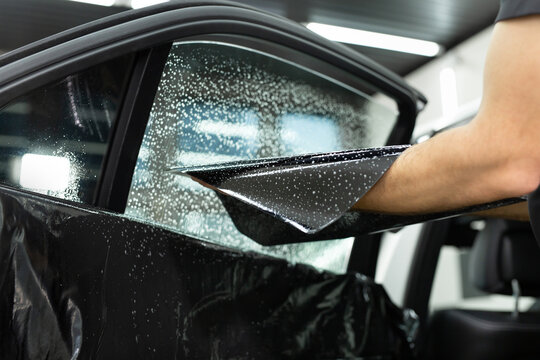How to Choose the Right Window Tinting for Your Car or Home
When considering window tinting for your car or home, it can be challenging to know where to start. With so many options available, making the right choice depends on several factors, such as the level of privacy, heat control, and aesthetics you want to achieve. Whether you’re looking to enhance your vehicle’s appearance or improve energy efficiency in your home, choosing the right tint can make a huge difference.
This guide will help you understand the fundamentals of window tinting, explore various options, and choose the best one for your specific requirements.
What is Window Tinting?
Window tinting is a process where a thin film is applied to windows, either to improve the aesthetic look or to provide functional benefits like heat reduction, UV protection, and privacy. The film can be made from various materials such as dyed, metalized, ceramic, or carbon, each offering different advantages.
Window tinting can be done on your car, home, or even in commercial buildings. The key to making the right choice lies in understanding the purpose of your tint and the best options available to you.
Why Should You Choose Window Tinting?
Before diving into the specifics of selecting the right type of window tinting, it’s important to understand why people choose to get it in the first place. There are many reasons to consider window tinting for your vehicle or property:
- UV Protection: One of the main reasons people opt for window tinting is to block harmful UV rays. These rays can damage your skin, cause fading to your car upholstery or furniture, and increase energy costs by letting excessive heat enter your home.
- Heat Reduction: Especially in warmer climates, window tinting is great for keeping your car or home cooler. It reduces the amount of heat that enters through the windows, making your space more comfortable.
- Increased Privacy: Tinting provides privacy by making it harder for outsiders to see into your home or car. Whether you’re parking in a busy area or just want to enjoy some privacy, window tinting helps ensure your space stays private.
- Glare Reduction: If you’re driving, especially in the early morning or late evening, the sun’s glare can make it difficult to see clearly. Tinting your car windows helps reduce glare and makes your driving experience more comfortable and safe.
- Aesthetic Appeal: Many people choose window tinting for the stylish, sleek look it gives to their car or home. The right tint can enhance the overall appearance and give your vehicle or building a modern and sophisticated touch.
How to Choose Window Tinting for Your Car
Choosing the right tint for your car involves understanding the different types of films available and how they can meet your specific needs.
- Understand Your Local Laws: Before you choose a tint, make sure to check your local laws regarding window tinting. Different regions have specific regulations about how dark your tint can be, especially for front windows. It’s important to comply with these laws to avoid penalties.
- Decide on the Type of Tint: There are several types of window tints available, and each one comes with its own benefits:
- Dyed Film: This type of tint is affordable and gives your car a sleek look. It absorbs heat and light but doesn’t block UV rays as effectively as other types.
- Metalized Film: This tint uses metal particles to reflect heat away from the car. It’s great for reducing heat and enhancing durability but may interfere with electronics like GPS or cell phone signals.
- Carbon Film: Carbon tints are a great option for those who want a stylish appearance with excellent heat and UV rejection. They don’t fade over time and provide long-lasting protection.
- Ceramic Film: If you’re looking for the best performance, ceramic tints are the way to go. They offer superior heat rejection, UV protection, and don’t interfere with electronics. However, they tend to be more expensive than other types.
- Choose the Right Shade: The shade of your tint will determine the amount of light that passes through your windows. If you want privacy, a darker shade might be appropriate. However, keep in mind that darker tints may not be allowed in certain areas. A lighter tint may provide just enough protection from UV rays while still keeping the interior visible.
How to Choose Window Tinting for Your Home
When it comes to residential window tinting, the process is slightly different. Homeowners typically look for energy-saving benefits and UV protection.
- Energy Efficiency: If you’re interested in improving your home’s energy efficiency, look for films that specifically target heat rejection. These films block a significant amount of heat from entering your home, which can reduce your air conditioning costs during hot months.
- UV Protection: Just like with car tinting, UV rays can cause fading to your furniture, carpets, and floors. Choosing a window tint that blocks a high percentage of UV rays helps preserve your interior’s color and quality. Most modern window films block up to 99% of UV rays.
- Privacy and Security: Tinting can also add an extra layer of privacy to your home. It prevents outsiders from looking inside, making it ideal for bathrooms or living rooms where you want to keep prying eyes away. Additionally, security films are thicker and can help prevent glass from shattering during a break-in.
- Aesthetic Enhancement: Residential window tinting can improve the curb appeal of your home. Tints come in various shades and finishes, allowing you to choose one that enhances the look of your home while offering practical benefits.
DIY vs. Professional Installation
While you may be tempted to go the DIY route, professional installation is always recommended for the best results. Window tinting needs careful attention to detail; even small mistakes can cause bubbles, peeling, or uneven tinting that affects the final look. A professional installer will ensure that the tint is applied smoothly and that it meets the legal requirements for your vehicle or home.
Conclusion
Choosing the right window tinting for your car or home depends on a variety of factors, including your specific needs, local regulations, and personal preferences. Whether you’re aiming for better heat protection, UV defense, or a more stylish appearance, there’s a tint option for you. Be sure to choose a professional installer to ensure your tint lasts and performs as expected.
By considering your needs and understanding the different types of window tints available, you can make an informed decision that adds value and comfort to your car or home.
FAQS:
1. What are the main benefits of window tinting?
Window tinting helps reduce heat and glare, provides UV protection, enhances privacy, and can improve the overall appearance of your vehicle or home.
2. Is window tinting legal in all areas?
No, window tinting laws vary by location. It’s important to check local regulations regarding the allowable tint levels for your car or home before installing.
3. How long does window tinting last?
With proper care, window tinting can last anywhere from 5 to 10 years, depending on the type of film used and the environmental conditions.
4. Can window tinting help with energy efficiency in my home?
Yes, window tinting can improve energy efficiency by blocking heat from entering your home, which reduces the load on your air conditioning and lowers energy costs.
5. Should I choose professional installation for window tinting?
Yes, professional installation ensures that the tint is applied correctly, preventing issues like bubbling or peeling, and ensures compliance with local laws.




